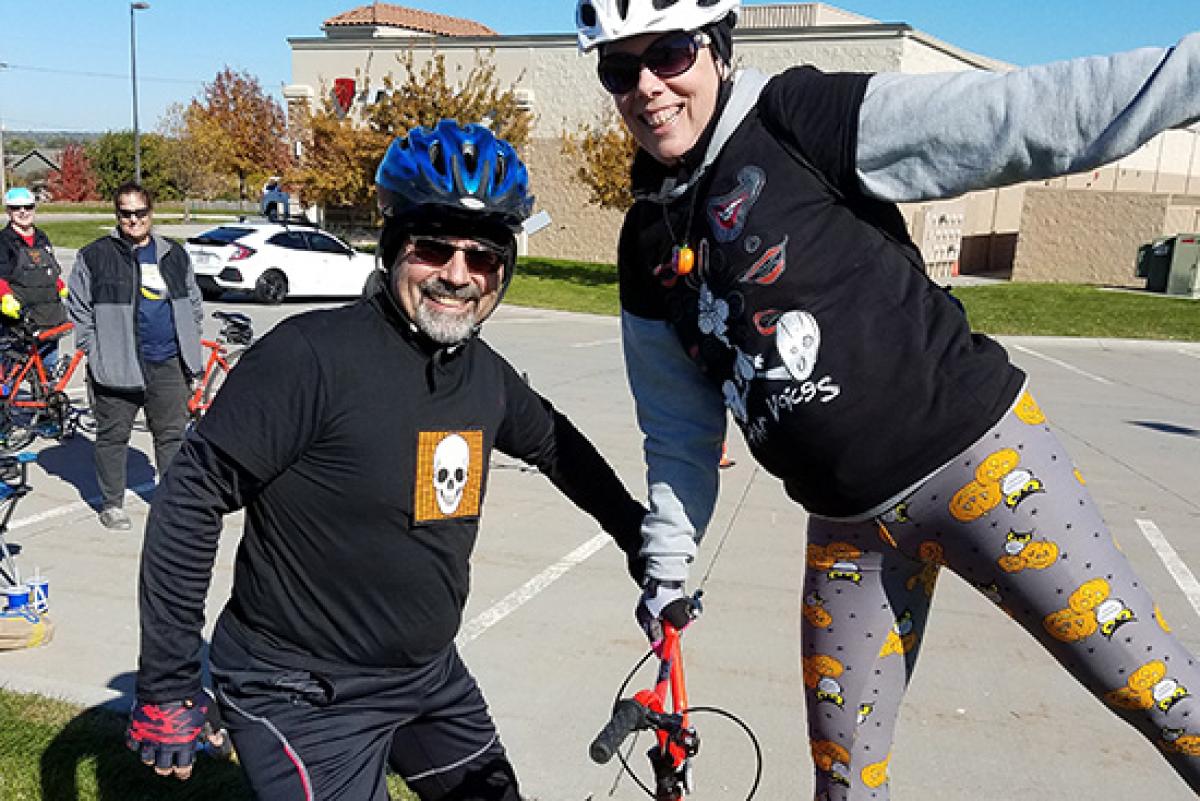Snap, crackle, pop! Do your knees talk back?

Do your knees go snap, crackle, pop? As Thomas Barber learned, this type of chatter may be a symptom of a more serious problem.
“I was in constant pain,” he says. “Then my knees started locking up and giving out. I heard clicking and popping noises. I couldn’t get up when I bent down.”
When the pain became unbearable, Barber decided it was time to see a doctor.
You don’t have to live with chronic knee pain. Call 800.922.0000 to make an appointment with one of our orthopaedic specialists for an evaluation.
A visit to Nebraska Medicine orthopaedic surgeon Beau Konigsberg, MD, confirmed his predicament. X-rays showed severe arthritis in both knees and his left hip. Dr. Konigsberg said Barber was a candidate for both knees and hip replacement surgeries.

In November 2018, Barber had his left knee replaced by Dr. Konigsberg. This was followed by a left hip replacement in February 2019 and then a right knee replacement in September 2019.
“I’ve recuperated well from all of my surgeries,” he says. An avid bike rider, Barber was even able to get some bike riding in between his left knee and hip surgeries.
After his most recent knee replacement, Barber says he was up and walking six hours after surgery. He took a few pain pills while he was in the hospital and switched to acetaminophen when he went home two days later. Physical therapy started the day of surgery and continued for the next six weeks at home.
“By three weeks, I was walking with little or no pain,” says Barber. “By six weeks I was up to a mile.”
“Total joint replacements have really improved over the last five to 10 years,” says Dr. Konigsberg. “Patients get out of the hospital quicker, usually after a day or two, and most are back to normal activity within three or four weeks. Aside from running or jumping, most people can exercise just fine. It’s reasonable to expect a knee replacement today to last 25 years.”
Surgical technology is also improving. For Barber’s most recent knee replacement, Dr. Konigsberg used a new robotic surgery platform called Navio that allows surgeons to customize the positioning of the implant based on the unique shape and motion of each patient’s knee.
“This system includes a presurgical planning technique that improves our ability to provide more precise alignment and optimal sizing of knee replacement components,” says Dr. Konigsberg. “This is important because precise alignment can be a critical factor in how long the implant lasts.”
The presurgery planning system also allows doctors to eliminate the need for CT scans which are normally needed in other robotic surgical systems to help doctors create a computer generated, surgical plan for each patient, notes Dr. Konigsberg. Navio is unique in that it doesn’t require CT scans.
“The hope is that this surgical system will lead to better outcomes, fewer revisions, and better patient satisfaction,” says Dr. Konigsberg. “Our goals are to provide significant pain relief to our patients and help them return to normal activity again so they can get back to doing what they enjoy most.”
Barber says he can’t wait to start riding his bike again. He typically rides to and from work, putting in more than 13 miles each way. He rides during the week with friends and hits the trails on weekends with his wife, sometimes logging as many as 2,000 miles during the summer months.
“I would recommend Dr. Konigsberg and the staff at Nebraska Medical Center to anyone,” says Barber. “He immediately put me at ease and explained everything in layman’s terms so I could understand exactly what was going to happen. I’d say he’s one of the best in the business.”
With two new knees and a new hip, Barber says he’s confident he’ll be back on the road again in the new year.
Osteoarthritis is one of the most common reasons to have knee replacement surgery. Knee replacements are also more prevalent among people who are overweight, which puts more stress on the joints. Other common reasons for knee replacement surgery include rheumatoid arthritis, gout or injury to the knee.
The following symptoms can be telltale signs that you may need a knee replacement, or at the very least, should seek medical advice:
- Severe knee pain that interferes with or even prevents everyday activities
- Pain persists even during rest; you feel moderate to severe pain at all times
- Popping or clicking in the knee joint with use
- Knee swelling and inflammation that have become stubborn
- Knee stiffness
- Bowing of the leg
- Nonsteroidal anti-inflammatory drugs fail to provide pain relief



